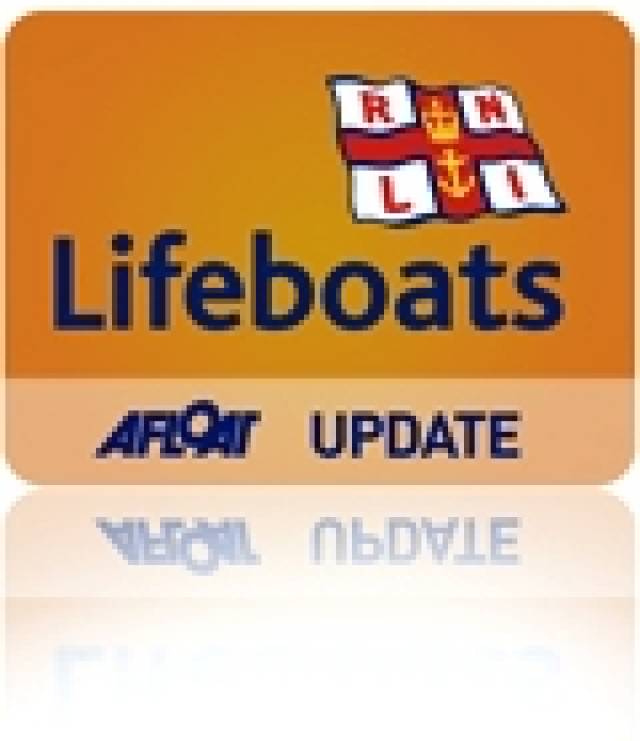#rnli – A Donegal woman who lost her father in a fishing tragedy when she was just six weeks old is lending her support to Mayday, the RNLI's national fundraising campaign which runs from 1-4 May.
Almost 28 years on from the tragedy, Eimear McDaid recently met with Anthony Chambers, a volunteer lifeboat crew member from Portrush in county Antrim, who can remember the day when he joined in the search for two missing fishermen from a crew of five, off the coast of Donegal.
It was on the 20 September 1987, that 27-year-old David McDaid from Glengad in Malin said goodbye to wife Sally and baby daughter Eimear and went fishing for crab on the Boy Shaun, from Portleen Pier, on what was an idyllic day for fishing. The weather was mild and the water was calm as the boat headed for Inishtrahull Island just off the coast of Malin Head.
Around lunchtime, another boat which had been in recent contact with the Boy Shaun, noticed that the vessel was no longer in view.
Eimear takes up the story: 'From what I have learned, the skipper then attempted to contact the Boy Shaun by radio but got no response. Fearing the worst, he steamed off in the direction of where they had last seen the boat and discovered a small amount of debris and oil slick on the water where they had last seen the Boy Shaun. They had just a short time earlier spoke to the crew of the boat about them both heading back to land to get home in time to watch the All-Ireland GAA football final.'
The skipper immediately raised the alarm. The area of the oil slick was searched and one survivor was discovered clinging to a short plank of wood from the stricken vessel. Two bodies, one of which was David's, were subsequently found.
Portrush RNLI was requested to launch and began a search with their colleagues from the Coast Guard, and fishermen and volunteers who were in the area, for the two men who were still missing. Sadly however, it was not until a few months later that their bodies were found on the coast of Scotland.
'None of the five fishermen were wearing lifejackets that day,' Eimear continued, 'I was told the crew would have found them to be too cumbersome to work with. Thankfully, lifejackets have much improved since then, and they are now neater and easier to wear.
'It was a tragedy that changed the course of life for my mother and me. I have grown up without a father and without answers as to what caused the boat to sink on what was described as such an idyllic fishing day. As a result of the tragedy however, we both have a healthy respect for the sea. It is a powerful force and one not to be reckoned with.
'Four very experienced fishermen paid the ultimate price 28 years ago. We can only hope by sharing our story that we can encourage others to respect the water too, to wear lifejackets and to support those who work to help save lives at sea.'
Anthony Chambers, Portrush RNLI mechanic can recall the tragedy: 'It was a Sunday and what I can remember vividly is that the water was very calm. We responded to the call as we still do by rushing to the station and preparing ourselves within minutes for the lifeboat to launch. Once on scene we searched with many others for the two remaining fishermen but unfortunately we couldn't bring them home. It was a terrible tragedy for the families involved.
'In the 28 years that have passed, our lifeboat crews have been on many call outs in all sorts of weathers and have faced many different types of conditions. Thankfully, we have been able to save lives and bring many people to safety and that is always rewarding. However, it still remains just as difficult for us now as it did then, if we have to return to shore knowing that a family has lost a loved one and this tragedy serves as a poignant reminder of that.'
Eimear and Sally have come together with the RNLI's volunteer lifeboat crews to show their support for this year's RNLI Mayday fundraising campaign. From Friday 1 May until Monday 4 May, collections and fundraising events will be taking place throughout Ireland. The events will have a welly theme, in a nod to the yellow wellies – an essential piece of kit – worn by the RNLI's volunteer crew members. The charity is encouraging people to show their support by donating, buying and wearing a yellow welly pin badge or by using the hashtag #YellowWelly on social media.
'My mother and I are supporting the RNLI Mayday campaign because we know first-hand the importance of having a dedicated lifeboat service. My father wasn't saved that day, but thousands of other fathers, men and women have been brought home safe through their bravery. Each person they have brought back is a family member brought home.'
The yellow welly was chosen for the Mayday campaign as it is an essential piece of RNLI crew kit. Waterproof with steel-capped toes, the specially designed boots keep the volunteer crew's feet warm and dry while also protecting them in dangerous conditions on deck. During gale force winds, rain and ice, keeping a sure footing can mean the difference between life and death for the volunteers.
Lifeboat crews are on call every day, all year round. Many have full-time jobs and carry a pager with them at all times to alert them to a lifeboat call out.
Last year, RNLI lifeboat crews from Ireland's 45 lifeboat stations launched 1,089 times, rescuing 1,414 people.
To donate and for ideas on how to get involved with Mayday visit www.rnli.org/MAYDAY.
You can also text RNLIMAYDAY to 50300 to donate €4 if you are in the Republic of Ireland.*































































